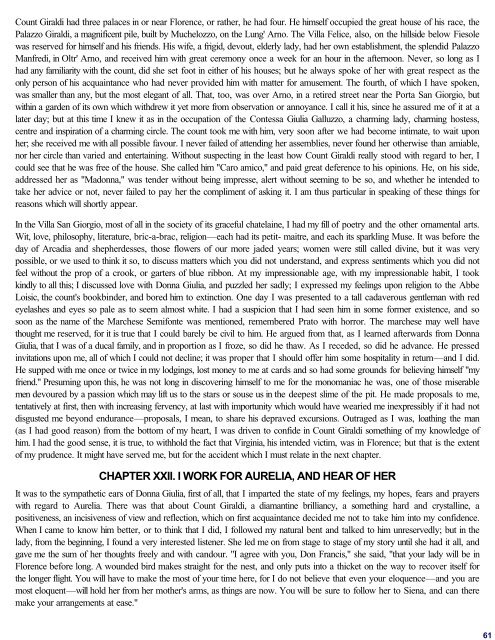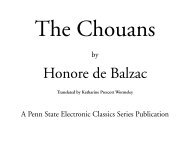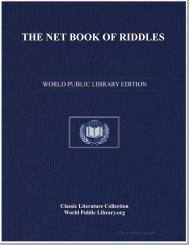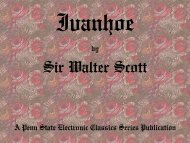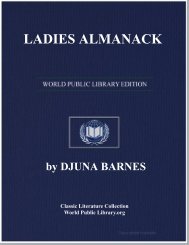THE FOOL ERRANT - World eBook Library - World Public Library
THE FOOL ERRANT - World eBook Library - World Public Library
THE FOOL ERRANT - World eBook Library - World Public Library
You also want an ePaper? Increase the reach of your titles
YUMPU automatically turns print PDFs into web optimized ePapers that Google loves.
Count Giraldi had three palaces in or near Florence, or rather, he had four. He himself occupied the great house of his race, the<br />
Palazzo Giraldi, a magnificent pile, built by Muchelozzo, on the Lung' Arno. The Villa Felice, also, on the hillside below Fiesole<br />
was reserved for himself and his friends. His wife, a frigid, devout, elderly lady, had her own establishment, the splendid Palazzo<br />
Manfredi, in Oltr' Arno, and received him with great ceremony once a week for an hour in the afternoon. Never, so long as I<br />
had any familiarity with the count, did she set foot in either of his houses; but he always spoke of her with great respect as the<br />
only person of his acquaintance who had never provided him with matter for amusement. The fourth, of which I have spoken,<br />
was smaller than any, but the most elegant of all. That, too, was over Arno, in a retired street near the Porta San Giorgio, but<br />
within a garden of its own which withdrew it yet more from observation or annoyance. I call it his, since he assured me of it at a<br />
later day; but at this time I knew it as in the occupation of the Contessa Giulia Galluzzo, a charming lady, charming hostess,<br />
centre and inspiration of a charming circle. The count took me with him, very soon after we had become intimate, to wait upon<br />
her; she received me with all possible favour. I never failed of attending her assemblies, never found her otherwise than amiable,<br />
nor her circle than varied and entertaining. Without suspecting in the least how Count Giraldi really stood with regard to her, I<br />
could see that he was free of the house. She called him "Caro amico," and paid great deference to his opinions. He, on his side,<br />
addressed her as "Madonna," was tender without being impresse, alert without seeming to be so, and whether he intended to<br />
take her advice or not, never failed to pay her the compliment of asking it. I am thus particular in speaking of these things for<br />
reasons which will shortly appear.<br />
In the Villa San Giorgio, most of all in the society of its graceful chatelaine, I had my fill of poetry and the other ornamental arts.<br />
Wit, love, philosophy, literature, bric-a-brac, religion—each had its petit- maitre, and each its sparkling Muse. It was before the<br />
day of Arcadia and shepherdesses, those flowers of our more jaded years; women were still called divine, but it was very<br />
possible, or we used to think it so, to discuss matters which you did not understand, and express sentiments which you did not<br />
feel without the prop of a crook, or garters of blue ribbon. At my impressionable age, with my impressionable habit, I took<br />
kindly to all this; I discussed love with Donna Giulia, and puzzled her sadly; I expressed my feelings upon religion to the Abbe<br />
Loisic, the count's bookbinder, and bored him to extinction. One day I was presented to a tall cadaverous gentleman with red<br />
eyelashes and eyes so pale as to seem almost white. I had a suspicion that I had seen him in some former existence, and so<br />
soon as the name of the Marchese Semifonte was mentioned, remembered Prato with horror. The marchese may well have<br />
thought me reserved, for it is true that I could barely be civil to him. He argued from that, as I learned afterwards from Donna<br />
Giulia, that I was of a ducal family, and in proportion as I froze, so did he thaw. As I receded, so did he advance. He pressed<br />
invitations upon me, all of which I could not decline; it was proper that I should offer him some hospitality in return—and I did.<br />
He supped with me once or twice in my lodgings, lost money to me at cards and so had some grounds for believing himself "my<br />
friend." Presuming upon this, he was not long in discovering himself to me for the monomaniac he was, one of those miserable<br />
men devoured by a passion which may lift us to the stars or souse us in the deepest slime of the pit. He made proposals to me,<br />
tentatively at first, then with increasing fervency, at last with importunity which would have wearied me inexpressibly if it had not<br />
disgusted me beyond endurance—proposals, I mean, to share his depraved excursions. Outraged as I was, loathing the man<br />
(as I had good reason) from the bottom of my heart, I was driven to confide in Count Giraldi something of my knowledge of<br />
him. I had the good sense, it is true, to withhold the fact that Virginia, his intended victim, was in Florence; but that is the extent<br />
of my prudence. It might have served me, but for the accident which I must relate in the next chapter.<br />
CHAPTER XXII. I WORK FOR AURELIA, AND HEAR OF HER<br />
It was to the sympathetic ears of Donna Giulia, first of all, that I imparted the state of my feelings, my hopes, fears and prayers<br />
with regard to Aurelia. There was that about Count Giraldi, a diamantine brilliancy, a something hard and crystalline, a<br />
positiveness, an incisiveness of view and reflection, which on first acquaintance decided me not to take him into my confidence.<br />
When I came to know him better, or to think that I did, I followed my natural bent and talked to him unreservedly; but in the<br />
lady, from the beginning, I found a very interested listener. She led me on from stage to stage of my story until she had it all, and<br />
gave me the sum of her thoughts freely and with candour. "I agree with you, Don Francis," she said, "that your lady will be in<br />
Florence before long. A wounded bird makes straight for the nest, and only puts into a thicket on the way to recover itself for<br />
the longer flight. You will have to make the most of your time here, for I do not believe that even your eloquence—and you are<br />
most eloquent—will hold her from her mother's arms, as things are now. You will be sure to follow her to Siena, and can there<br />
make your arrangements at ease."<br />
61


